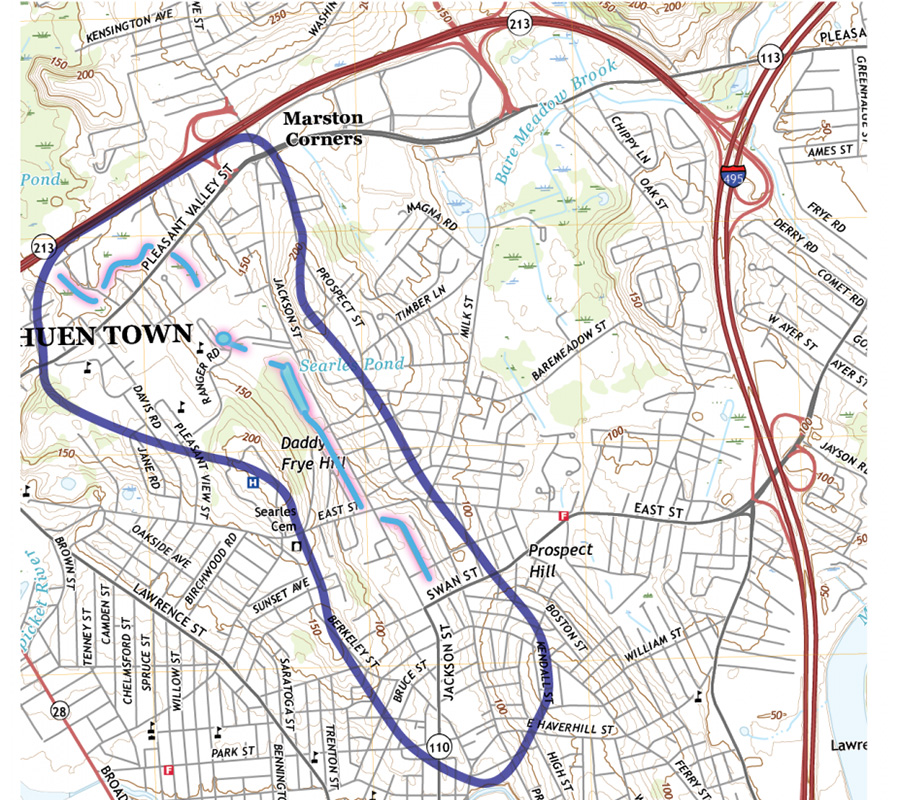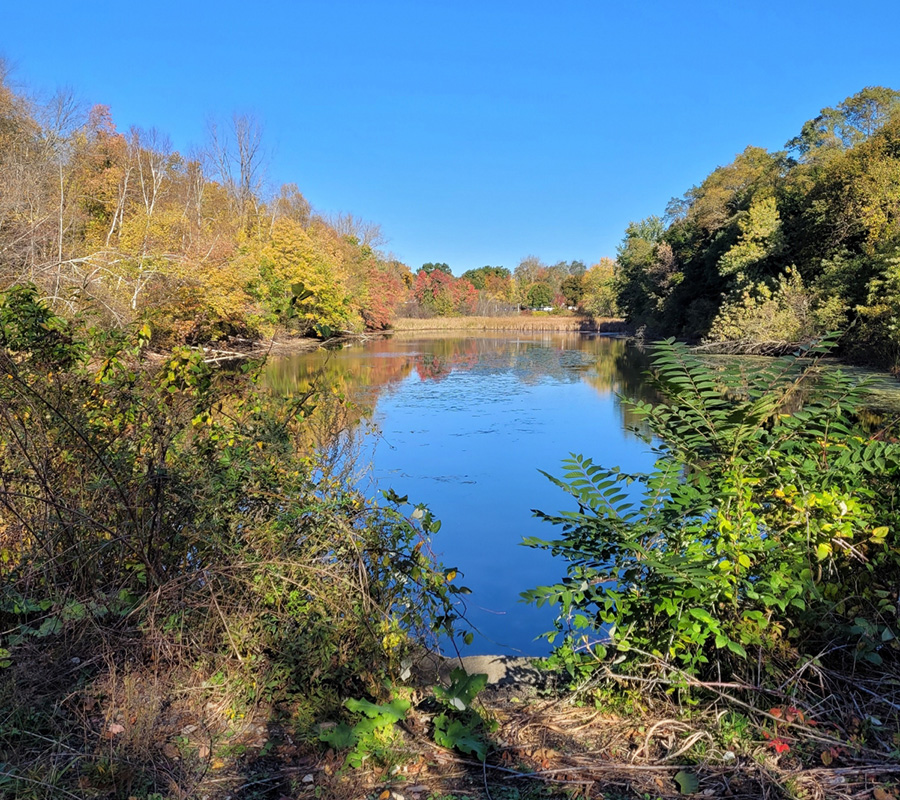Bloody Brook and Searles Pond Resilience Plan
A community driven flood mitigation and climate adaptation plan for the Searles Pond/Bloody Brook corridor in Methuen and Lawrence.
Details
For most of its relatively short run, the Bloody Brook is underground; the brooks natural course was altered and directed into culverts over a century ago. The daylighted section of the brook runs along Queen Ave, crossing Jackson Street and flowing along Bicknell Ave, where it runs through the front yards of nearly a dozen homes before entering a culvert for the rest of its run to the Spicket River. Searles Pond serves as a stormwater catchment for Jackson St/Prospect St section of Methuen. The area includes Methuen High School, the Tenney Grammar School and Holy Family Hospital. The pond is the headwaters of the Bloody Brook that runs from the pond into the Spicket River in Lawrence.
Flooding has been a long simmering problem for residents in the area. This flooding is exacerbated by differing culvert sizes in neighboring Lawrence that prevents efficient drainage, as well as the increasing intensity of storm events making the existing culverts and crossings increasingly incapable of handling peak flows. In addition to property damage caused by flooding, residents complain about the presence of wildlife and other animal pests attracted by water flowing through their property.
Searles pond itself presents both challenges and opportunities. The pond handles stormwater flows from surrounding uplands and roadways but has limited capacity to effectively treat runoff. Habitat values in the pond and surrounding uplands are poorly understood and invasive vegetation presents a management challenge. The pond has significant ecological and recreational potential, especially if a meaningful connection can be maintained with the adjacent woodlands around Holy Family Hospital.


The Project
Bloody Brook and the Searles Pond Resilience Plan is primarily a community-focused flood mitigation study. While an engineering team will conduct a technical evaluation of the hydrology of the pond and brook, residents along the brook will be surveyed about their experience with flooding and how it impacts their lives. This information will help guide the exploration of mitigation options to alleviate flooding and improve water quality. More importantly, the long-term impact of climate change, already being felt throughout the Merrimack Valley, will inform any possible solutions. Since improving conditions starts with Searles Pond, the pond ecosystem, including the upland forest will also be part of the resilience plan. Ultimately, addressing the impacts of flooding and climate change requires effective management of the entire pond ecosystem and presents an opportunity to turn underused open space into a community asset.
Community Engagement
This project will, from the outset, be community-driven. That means the stakeholders in the Bloody Brook/Searles Pond corridor, residents, businesses, schools, churches, will be involved from the beginning and their experiences, concerns, and needs will drive both the research and the solutions that this project creates.
Groundwork Lawrence will conduct door-to-door canvassing to meet with residents who, literally, live with the Bloody Brook and its impacts every day. Residents will be asked to complete surveys to gather important information about flood impacts that will help engineers better understand the brooks’ hydrology. Other stakeholders including Methuen High School and Holy Family Hospital will be invited to collaborate on the project and help craft plans to address flooding and turn Searles Pond into a well-managed, climate resilient asset to the community.
The culmination of this project will be the creation of a resilience management plan that will provide management options for dealing with flooding, water quality, and climate change. These options will include ways to manage Searles Pond and the adjacent upland areas for wider public use while restoring habitat functions along the entire corridor. The plan will be guided by the needs and concerns of the stakeholders in the community.
Ways to Get Involved
This project starts with community engagement. Community members, especially those who live or work near Searles Pond and The Bloody Brook, are invited to complete our survey and help guide our research. There will be several community meetings and workshops that the public can attend.
Water Testing
Are you interested in water quality monitoring? As a part of this project, we’ll be monitoring bacteria and other parameters in Searles Pond and Bloody Brook. Become a community scientist and help us collect data in your own neighborhood! Email Susie at the Merrimack River Watershed Council for more information: susie@merrimack.org
What is MVP?
The Municipal Vulnerability Preparedness (MVP) grant program created in 2017 as part of Governor Baker’s Executive Order 569 provides support for cities and towns in Massachusetts to identify climate hazards, assess vulnerabilities, and develop action plans to improve resilience to climate change. Communities that complete the MVP Planning Grant process become designated as an MVP Community and are eligible for MVP Action Grant funding to implement the priority actions identified through the planning process.
Groundwork Lawrence is working with the Town of Methuen to engage the community as part of the Searles Pond and Bloody Brook climate resilience study. The project will be an in-depth study of the pond and brook to better understand flooding and water quality challenges and identify possible solutions with an eye toward a changing climate. This is being done through the MVP Planning Grant which offers funding to municipalities that wish to assess their vulnerability to and prepare for climate change impacts, build community resilience, and receive designation from the Executive Office of Energy and Environmental Affairs (EEA) as an MVP Community. MVP Communities are eligible for MVP Action Grant funding to implement the priority actions identified through the planning process.
Groundwork Lawrence recently worked with the City of Lawrence on their MVP Action Grant that focused on preparing the DPW yard for flood emergencies with climate change in mind. MVP Action Grants offers financial resources to municipalities that are seeking to advance priority climate adaptation actions to address climate change impacts resulting from extreme weather, sea-level rise, inland and coastal flooding, severe heat, and other climate impacts.
